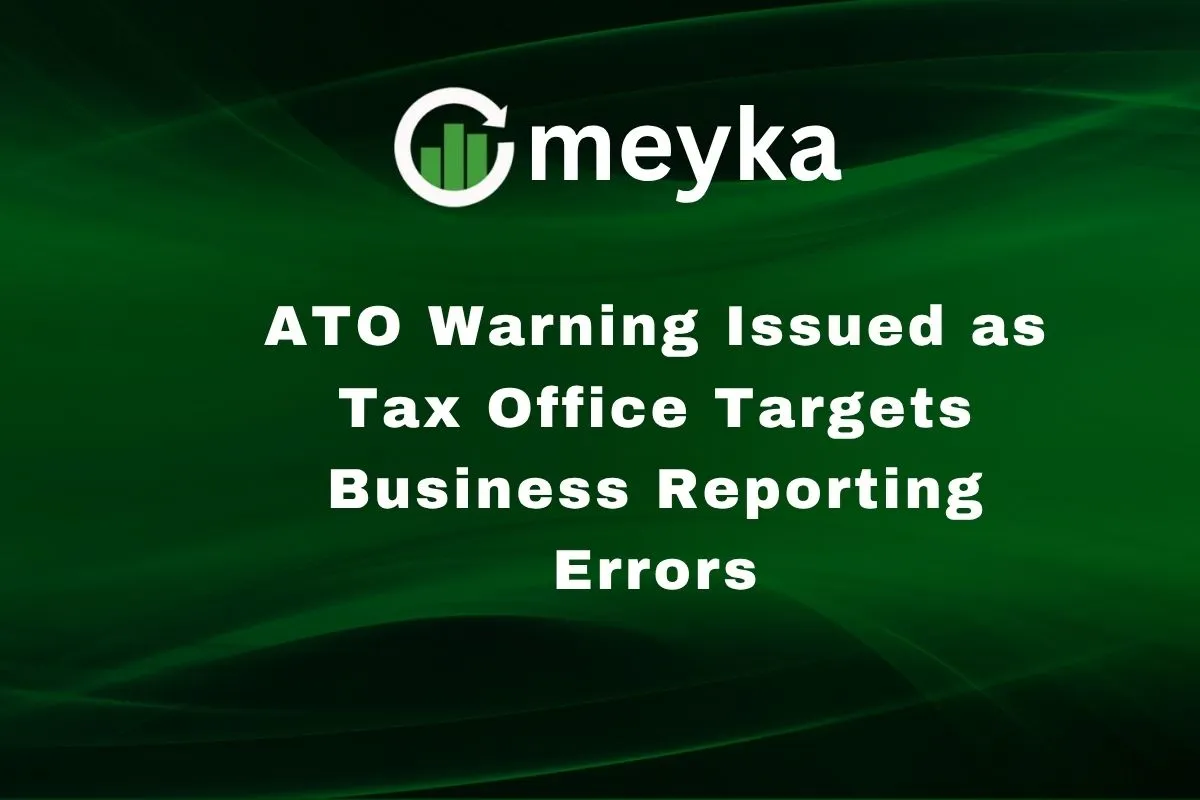ATO Warning Issued as Tax Office Targets Business Reporting Errors
The Australian Taxation Office (ATO) is sending a clear message: they are watching business reporting more closely than ever. We see reports that the ATO is using more data systems, cross checking bank records, payroll, and invoices. This new warning matters because even small mistakes can now be caught fast. We examine why the ATO issued this warning, the most common errors it is finding, which industries are most at risk, how the ATO is using tools to detect issues, and what consequences businesses may face. We aim to help you understand the risks and stay on the right side of the rules.
Why the ATO Issued the Warning
The ATO’s latest alert is no coincidence. They have flagged that many businesses, especially smaller ones, are making reporting mistakes. These errors often lead to underpaid tax, incorrect GST claims, or mismatches in payroll data. As businesses evolve and use more digital tools, the ATO has also upgraded its systems. It now employs stronger data matching and automation to cross-check what businesses report against what third parties (banks, e-commerce platforms, insurers) show.
The scale of the issue is large. For example, in the 2023–24 year, around 9 million Australians claimed work-related deductions totalling about AUD 28 billion. Many claims were rejected because they were for private or ineligible items.
The ATO’s goal is to ensure fairness and reduce the tax gap (the difference between taxes owed and taxes paid). By putting pressure on business reporting, they hope to reduce non-compliance and boost trust in the system.
Common Business Reporting Errors
Here are some typical mistakes that the ATO sees:
Underreporting Income
Some businesses or side hustles don’t report all revenue. For instance, a person might earn AUD 100,000 via side work and fail to declare it. That triggers ATO action.
Incorrect GST/BAS Lodgments
Errors include:
- Claiming GST on expenses that are not actually subject to GST
- Failing to charge GST on taxable sales
- Mixing up tax codes or double-counting GST credits
Payroll Reporting Mistakes (STP Errors)
Single Touch Payroll (STP) reporting must align with what employees report. Mismatches between payroll, BAS, and tax returns are red flags.
Misclaiming Deductions / Mixing Business & Personal Costs
Problems occur when people treat private items, like home appliances or gym equipment, as work expenses. They also fail to apportion shared use correctly.
Weak Record-Keeping
Lack of invoices, missing documents, or poor ledger systems make it hard to justify claims. If asked by the ATO, incomplete records often lead to adjustments or penalties.
Industries Under the Microscope
Some sectors are drawing more attention from the ATO:
- Trade & Construction: Builders, plumbers, electricians, and tradies are being flagged often.
- Professional Services: Accountants, engineers, consultants face scrutiny, particularly when their turnover is between AUD 1 million and 10 million.
- Hospitality & Retail: Cash-based industries are higher risk because cash can be under-reported.
- Sharing Economy / Gig Platforms: Income from Airbnb, Uber, online selling is now fed into ATO systems for cross checking.
Because these sectors often deal in both cash and digital transactions, errors or omissions stand out more easily to ATO systems.
ATO Compliance Tools and Data Tracking
The ATO relies heavily on powerful tools to spot reporting errors:
- Data Matching & Cross-Referencing
The ATO compares what businesses report with data from banks, insurers, digital platforms, and government agencies. - Expanded Data Sources
From 2025 onward, ATO is tapping into new data from crypto exchanges, property records, insurance, and online marketplaces. - Lifestyle Asset Matching
The ATO matches declared income against “big ticket” items like cars, boats, art, or aircraft. If value of assets doesn’t align with reported income, that raises a red flag. For example, a car over AUD 65,000 or artworks over AUD 100,000 may be scrutinised. - Monthly GST Reporting for Non-compliant Businesses
The ATO is shifting businesses that make frequent errors from quarterly to monthly GST reporting to keep them under tighter control.
These systems give the ATO increasingly real-time oversight. That means small discrepancies can be flagged quickly.
Consequences of Reporting Errors
When the ATO finds errors, the fallout can be serious:
- Penalties and Interest: Businesses may pay fines or general interest charges on amounts that were underpaid.
- Audits and Reviews: Errors often lead to deeper reviews or full audits, demanding more scrutiny and documentation.
- Legal Penalties in Serious Cases: For fraud or intentional deception, business owners can face criminal charges. Recently, three people were jailed for fraudulent GST claims, involving tens to hundreds of thousands of dollars.
- Reputational and Operational Damage: A business under investigation may lose clients or suffer brand damage. Also, time and money are diverted toward legal or accounting processes.
- Backdated Debt Collections: The ATO is even pursuing older debts from many years back, sometimes dating to 2006, causing stress for those who lack documentation.
The message is clear: mistakes, even unintentional ones, carry real costs now.
Conclusion
The ATO Warning isn’t just rhetoric. It reflects a shift in how the tax office works. With smarter data systems, cross-agency matching, and more sources of information, business reporting errors are less likely to slip through. We see growing enforcement, especially in sectors prone to cash or mixed revenue. The consequences can be heavy, from fines to audits to legal action.
Staying alert, keeping accurate records, and understanding what’s under scrutiny can make all the difference. The ATO is watching, and businesses need to respond.
FAQS:
A warning letter from the ATO is a notice sent to businesses or individuals. It alerts them about mistakes, missing information, or potential non-compliance in their tax reporting.
The ATO is targeting businesses and individuals who make reporting errors. This includes underreporting income, wrong GST or payroll lodgments, misclaimed deductions, and poor record-keeping practices.
The three golden rules are: report income accurately, claim only eligible deductions, and keep proper records. Following these helps avoid penalties, audits, and legal issues.
Disclaimer:
This content is for informational purposes only and is not financial advice. Always conduct your research.






